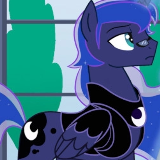
- Member Since 10th May, 2014
- offline last seen Aug 20th, 2019
Raichu
I’m a feminist woman looking to write stories on a male dominated site. It’s an uphill battle but a satisfying one, only as long as I succeed.
Also LikedSimilarAuthor
- Magic Man · 102k words · 806 30 · 23k viewsChrysalis has never been what most would call an 'ideal mother' to her only living daughter, the sickly Crown Princess Pupa. However, after a dreadful incident, the Changeling Queen is forced to confront her missteps as both a mother and a ruler.
- Sonik · 37k words · 488 25 · 8.2k viewsA few days after the events of the royal wedding, Twilight gives news to Fluttershy to rat out any changelings she sees. This makes her anxious, so she takes a walk. On this walk, she finds something that she never thought that she would.
- Fluttershy comes across an injured changeling and attempts to help it. After taking it in the changeling reveals a secret that could either change the relationships between ponies and changelings, or start a war.Cone of Wonders · 4.6k words · 33 1 · 1.2k views
- Legofan · 47k words · 217 12 · 7.8k viewsUnicron awakens, threatening Cybertron's existence. Galvatron refuses to see the truth, however, and Starscream sacrifices himself to unite the warring factions. But instead of death, Starscream is gifted with continued life in a new land.
- Zombificus · 52k words · 37 1 · 1.4k viewsChrysalis has won the battle: Canterlot - and soon, all of Equestria - is hers. But staining her perfect day crimson is one casualty: one death she cannot - will not - allow. No matter the cost.
- Silent Quill · 95k words · 789 22 · 16k viewsThe Changelings have been violently ejected from Canterlot, now they need to pick up whatever pieces are left...
- Raichu · 5.3k words · 38 3 · 1.4k viewsRumble's gotten himself into a very unfortunate situation...
- Raichu · 10k words · 47 5 · 2k viewsSomething is out there. It had powers that seem unstoppable. It is not of this world. It also says 'Pika' a lot.
- Raichu · 9.2k words · 104 20 · 2.1k viewsAfter not seeing Twilight Sparkle for years, Princess Celestia is surprised when Twilight shows up at the castle, needing a foalsitter for the daughter Celestia never knew she had. This filly is far from normal as Celestia will soon learn...
- Raichu · 2.3k words · 17 0 · 746 viewsPinkie Pie tells a story about a creature that nearly destroys Equestria.
- Raichu · 2k words · 28 3 · 968 viewsDeep in the Everfree Forest, there lives a creature who is not quite fish but not quite pony. Legend has it that if you spot the creature and do not run in fright then it will grant you three wishes. Scootaloo finds it.
Stats
Page generated in 0.103 seconds
Total duration
975 users online
1,673,321 hits today, 2,782,760 yesterday
FIMFiction
My Little Pony: Friendship is Magic Fanfiction
Designed and coded by knighty & Xaquseg - © 2011-2024
Follow & Support Us
![]() Support us
Support us
SubStar
Chat!
Discord
Follow us
Twitter
MLP: Friendship is Magic® - © 2024 Hasbro Inc.®
Fimfiction is in no way affiliated with or endorsed by Hasbro Inc.®


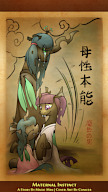
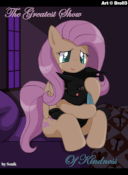



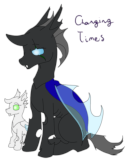


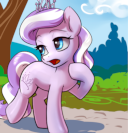

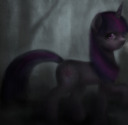







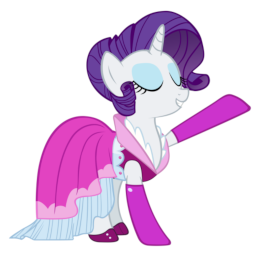
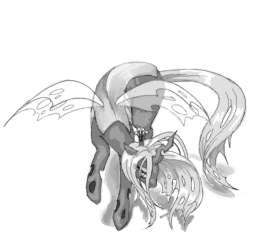
You seem to switch between the names "Heart Felt" and "Heat Felt" an awful lot, which looks quite dodgy. Nice little story otherwise.
Princess Celestia is extremely OOC here. You've made her so shortsighted and thick that she doesn't even seem to understand that possibility of extinction is realistic, or realize the potential consequences of having expelled the changelings.
For a ruler as wise and experienced as Celestia to both miss the implications of events and react in such horror and guilt when she's blindsided by the results just doesn't work, and for me that breaks the story.
I also don't think it's in the realm of plausibility that Chrysalis would try to pass off the lie to her daughter about being related to Celestia, or for Celestia to assent to this plan. They have to know that this won't work in the long term and that when it blows up in everyone's faces, it's only going to make things a terrible, painful mess.
5717938 Oh it will be a terrible painful mess and I plan to make a sequel with some changeling backstory and history and chaos. Who doesn't love a good bit of chaos?
5717944 Am I to assume that the sequel will tell the story of Heart Felt? I would be interested in reading it.
5718269 For the most part.
SEQUEL NOW
This is a wonderful little story! I need a sequel!!!!! Keep up the good work!
Keep up the good work!
You got the sad tag right!!!
I would recommend entirely removing "Princess Celestia asked." as the verb, "asked", carries no real impact or purpose & using the Princess' name serves only to show her presence; within that introductory paragraph you mention her name more than once & easily establish the characters in the scene. Furthermore, without that "Princess Celestia asked." the reader likely concludes the following: having read the description(s), logically one deduces that either the Princess or the Queen currently speaks & by simply having "Why?" (sans speaker) an incentive to continue reading builds as the curt brevity of the question begs the question of who speaks thusly & why in such a manner; does the Princess issue that brusque utterance &, if so, what spurs this?
Also, that first question might produce more impact if it were separated into its own paragraph; the slight pause between paragraphs would increase the reader's anticipation of the character speaking & to whom he/she is speaking.
"Queen Chrysalis stood" could be improved with more descriptive language, though it does function satisfactorily; as this is the introductory paragraph, a stronger verb or more vivid imagery would better serve to hook readers.
Compounding the complication of that somewhat pedestrian verb "stood", its succeeding phrase could also benefit marginally from a more active narrative voice. The remainder of the sentence sounds clunky & overdrawn in that three descriptive phrases are seemingly stapled onto that simple sentence "Queen Chrysalis stood": these three phrases, "in her room", "with a ragged look", & "on her face", read more as a list than an image. To improve this more reader involvement is required.
For example, "Queen Chrysalis stood, looking ragged," possesses an active voice as the verb of "looking" engages the reader with ongoing action; the Queen doesn't passively stand with a look as, rather, she stands there looking ragged-- she herself is actively looking ragged. In addition, the total word count of the sentence reduces with this alteration, allowing it to flow more fluidly.
That phrase "in her room" appears entirely unnecessary as the following sentence establishes the physical setting; so, cut it. Regarding the final phrase ("on her face"), again a mere extraction is suggested: why limit that "ragged" look to the Queen's face alone? To remove this phrase is to allow readers more freedom in envisioning the Queen-- that freedom allows for the implicit image of disheveled hair, scuff marks, bruises, scrapes, etc. to surface.
As with the sentence previous, this one lacks any level of reader interaction: the weak verbs "was" & "had" could be entirely removed & the sentence would maintain the same effect, ultimately.
The room small, no guards in it and locked.
Whilst grammatically incorrect, the point still stands: engage readers with attention-grabbing verbs. Also, the adjective "small" holds minimal meaning-- it's used so frequently & contextually that here, in attempting to set a scene, it holds no significance. Simply searching "define small" on Google lists several synonyms that could be employed for greater efficacy. An example of this, "compact" produces a specific image of a tight space, dense with objects & furniture; alternatively, if you desired a more characterizing setting, that term "utilitarian" offers the image of a small, highly organized space that reflects a minimalist lifestyle in its inhabitant. There exist numerous options for whatever you goal might be (implicitly describing a character, more accurately describing the physical setting, etc.).
It is recommended that phrase "had no guards in it" be removed also as it serves no purpose, save the detriment of the sentence itself: common canon & show canon dictates guards do not stand in the Princesses' chambers as they guard their entrances &, thus, there is no need to affirm their absence. It seems redundant to readers & actually disrupts the story's flow in making the reader pause & consider "Why is the author stating the obvious?" In addition to this disruption, "in it" merely serves to slow the sentence down with unnecessary syllables. Even in the original sentence this holds true as "The room was small, had no guards and was locked." reads more fluidly than "The room was small, had no guards in it and was locked."
You're missing an Oxford Comma, also. Excluding an Oxford Comma is an undeniable grammatical error; if you wish me to go into the proof of such an assertion, then by all means I shall, but know the Oxford Comma is essential to correct grammar.
Again, "was" proves a weak verb & thus requires replacing. There also doesn't seem to be any justification for why the room is locked & hence that fact seems irrelevant; so, cut it. If it serves a future purpose, it may be incorporated in other ways, without the use of the weak word "was".
Also, as short as this sentence is, it may prove more fluid when combined with the previous sentence as shown below.
Original:
“Why?” Princess Celestia asked. Queen Chrysalis stood in her room with a ragged look on her face. The room was small, had no guards in it and was locked.
Proposed:
"Why?"
Queen Chrysalis stood, looking ragged, in Celestia's locked room.
As aforementioned, the narration here lacks vitality; this distances the reader from the story & prevents immersion. The passive verb phrase of "had _", when coupled with that weak verb "to be" (or in this case "been"), slows the flow of the story & bores the reader.
The structure, diction, & tone of this sentence are overall rather humdrum; it "tells" more than "shows", as some might say. First, it tells the reader what was happening: "Celestia had been enjoying her time". Then, it tells the reader what caused that to change in stating "when Queen Chrysalis appeared". "in her room" can be cut altogether as within this same paragraph the setting has already been stated.
To allow for a more fluidity & immersion, I propose the following: combine both this sentence & its following with special adherence to an active voice of narration to produce a more engaging atmosphere & narrator.
The duet of "her time" seemed too long & thus I shorted it to "herself" (one word). Then, I replaced "when" with "until"; "when" originally only emphasized the passive voice in further setting the event of Chrysalis' appearance in the past whereas the proposed "until" played a more present role: Celestia had enjoyed herself until THIS DID THAT-- it takes the passive beginning of the sentence & flips it on its head; the sentence builds up to an active verb like a fist flying throw the air before hitting something. The dependent clause "startling the Princess" also remains active as the verb "startle" is presented in its present form "startling", thus making the action seem like its happening now rather than in the past.
The hard consonants of "Q" in "Quick" & "c" in "recover" come in rapid succession as their words are short & no more than three syllables (two of which in re-cov-er are unstressed syllables), allowing for a brisk pace to be kept whilst reading (the flow of the previous sentence is carried into the second).
Other words were cut to keep the flow going; for example, the adjective "glowing" not only slowed the sentence flow with its dual stressed syllables, it also seemed unnecessary as horns only glow when magic is being used or built up into a spell already decided upon & here Celestia is doing neither. The hard consonant sound at the end of "neck" served when in ending the flow of the sentence & paragraph cleanly, allowing the reader to begin the next paragraph without an awkward transition of rhythm.
Thusly concluding, my proposal for the introductory section is enclosed below:
What did you disagree, or agree, with?
obviously its not
perfect as context &
structure could also be
reworked but let me know
ur thoughts on
these suggestions
fgt
that only took like
20 minutes ;P
That is all. Equestria is ours.
7642761 I'm literally crying tears of joy. No one's ever given me any proper feedback in my entire life. All I get is praise, praise, praise that my story was great or something like that but nobody ever gives me actually feedback. Thank you so, so much.
7643118
wow fuck u
spoiled cunt i
aint ur shoulder
to lean on
fgt
That is all. Equestria is ours.